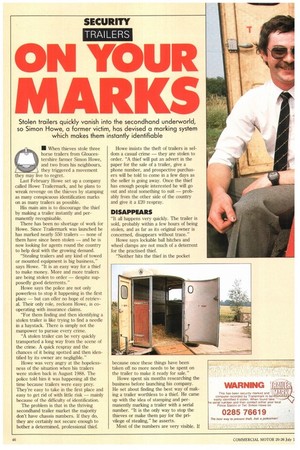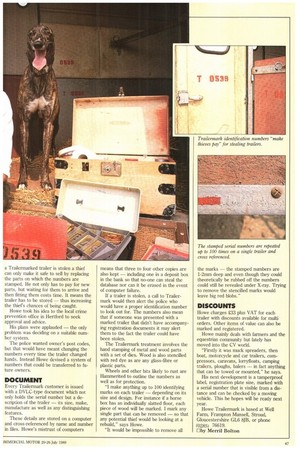ON YOUR
Page 48

Page 49

If you've noticed an error in this article please click here to report it so we can fix it.
MAS
Stolen trailers quickly vanish into the secondhand underworld, so Simon Howe, a former victim, has devised a marking system which makes them instantly identifiable
• When thieves stole three horse trailers from Gloucestershire farmer Simon Howe, and two from his neighbours, they triggered a movement they may live to regret.
Last February Howe set up a company called Howe Trailermark, and he plans to wreak revenge on the thieves by stamping as many conspicuous identification marks on as many trailers as possible.
His main aim is to discourage the thief by making a trailer instantly and permanently recognisable.
There has been no shortage of work for Howe. Since Trailermark was launched he has marked nearly 550 trailers — none of them have since been stolen — and he is now looking for agents round the country to help deal with the growing demand.
"Stealing trailers and any kind of towed or mounted equipment is big business," says Howe. "It is an easy way for a thief to make money. More and more trailers are being stolen to order — despite supposedly good deterrents."
Howe says the police are not only powerless to stop it happening in the first place — but can offer no hope of retrieval. Their only role, reckons Howe, is cooperating with insurance claims.
"For them finding and then identifying a stolen trailer is like trying to find a needle in a haystack, There is simply not the manpower to pursue every crime.
"A stolen trailer can be very quickly transported a long way from the scene of the crime. A quick respray and the chances of it being spotted and then identified by its owner are negligible."
Howe was very angry at the hopelessness of the situation when his trailers were stolen back in August 1988. The police told him it was happening all the time because trailers were easy prey. They're easy to take in the first place and easy to get rid of with little risk — mainly because of the difficulty of identification.
The problem is that in the thriving secondhand trailer market the majority don't have chassis numbers. If they do, they are certainly not secure enough to bother a determined, professional thief. Howe insists the theft of trailers is seldom a casual crime — they are stolen to order. "A thief will put an advert in the paper for the sale of a trailer, give a phone number, and prospective purchasers will be told to come in a few days as the seller is going away. Once the thief has enough people interested he will go out and steal something to suit — probably from the other side of the country and give it a £20 respray.
DISAPPEARS
"It all happens very quickly. The trailer is sold, probably within a few hours of being stolen, and as far as its original owner is concerned, disappears without trace."
Howe says lockable ball hitches and wheel clamps are not much of a deterrent for the practised thief.
"Neither hits the thief in the pocket because once these things have been taken off no more needs to be spent on the trailer to make it ready for sale."
Howe spent six months researching the business before launching his company. He set about finding the best way of making a trailer worthless to a thief. He came up with the idea of stamping and permanently marking a trailer with a serial number. "It is the only way to stop the thieves or make them pay for the privilege of stealing," he asserts.
Most of the numbers are very visible. If a Trailermarked trailer is stolen a thief can only make it safe to sell by replacing the parts on which the numbers are stamped. He not only has to pay for new parts, but waiting for them to arrive and then fitting them costs time. It means the trailer has to be stored — thus increasing the thief s chances of being caught.
Howe took his idea to the local crime prevention office in Hertford to seek approval and advice.
His plans were applauded — the only problem was deciding on a suitable number system.
The police wanted owner's post codes, but that would have meant changing the numbers every time the trailer changed hands. Instead Howe devised a system of numbers that could be transferred to future owners.
DOCUMENT
Every Trailermark customer is issued with a DVLC-type document which not only holds the serial number but a description of the trailer — its size, make, manufacture as well as any distinguishing features.
These details are stored on a computer and cross-referenced by name and number in files. Howe's mistrust of computers means that three to four other copies are also kept — including one in a deposit box in the bank so that no-one can steal the database nor can it be erased in the event of computer failure.
If a trailer is stolen, a call to Trailermark would then alert the police who would have a proper identification number to look out for. The numbers also mean that if someone was presented with a marked trailer that didn't have accompanying registration documents it may alert them to the fact the trailer could have been stolen.
The Trailermark treatment involves the hand stamping of metal and wood parts with a set of dies. Wood is also stencilled with red dye as are any glass-fibre or plastic parts.
Wheels and other bits likely to rust are Hammerited to outline the numbers as well as for protection, "I make anything up to 100 identifying marks on each trailer — depending on its size and design, For instance if a horse box has an individually slatted floor, each piece of wood will be marked. I mark any single part that can be removed — so that any potential thief would be looking at a rebuild," says Howe.
"it would be impossible to remove all the marks — the stamped numbers are 1-2mm deep and even though they could theoretically be rubbed off the numbers could still be revealed under X-ray. Trying to remove the stencilled marks would leave big red blobs."
DISCOUNTS
Howe charges £33 plus VAT for each trailer with discounts available for multi orders. Other items of value can also be marked and registered.
Howe mainly deals with farmers and the equestrian community but lately has moved into the CV world.
"Firstly it was muck spreaders, then boat, motorcycle and car trailers, compressors, caravans, lorryfloats, camping trailers, ploughs, balers — in fact anything that can be towed or mounted," he says.
His next development is a tamperproof label, registration plate size, marked with a serial number that is visible from a distance and can be checked by a moving vehicle. This he hopes will be ready next year.
Howe Trailermark is based at Well Farm, Frampton Mansell, Stroud, Gloucestershire GL6 8JB, or phone (0285) 76619.
Oby Merril Bolton








































































































































